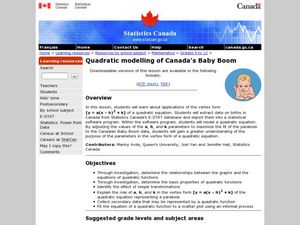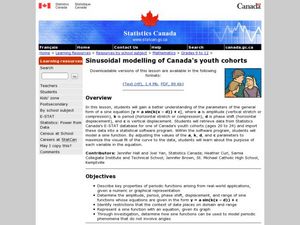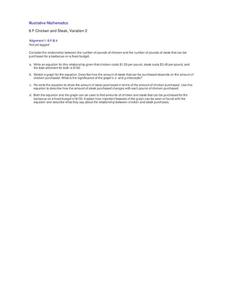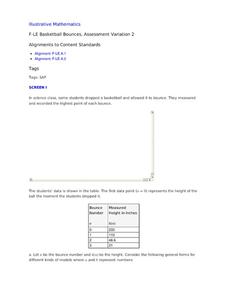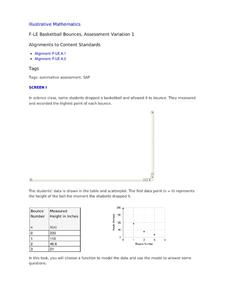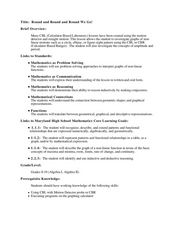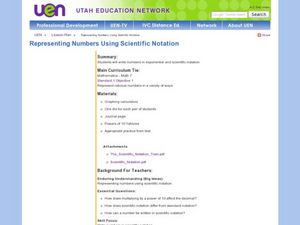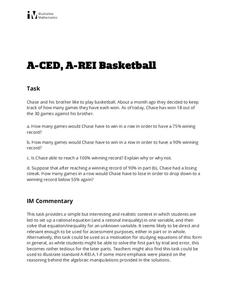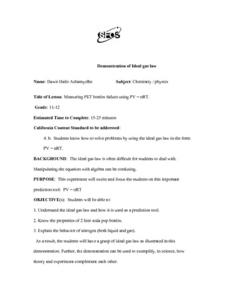Curated OER
Quadratic Modeling Of Canada's Baby Boom
Students model quadratic equations. In this algebra lesson, students are given data to graph using a function. They investigate vertex and transformation of quadratic functions.
Curated OER
Quadratic Rules and Graphs
Students identify the properties of quadratic equations. In this algebra lesson, students find the vertex and intercepts of a parabola. They factor quadratics and identify the zeros of the equations.
Curated OER
More Complicated Functions: Introduction to Linear Functions
Learners explore the concept of linear functions. In this linear functions instructional activity, students translate linear functions from tables to graphs to equations. Learners use an applet to write a function rule for a linear...
Curated OER
Sinusoidal modelling of Canad'a youth cohorts
Students explore the general form of the sine equation. For this trigonometry lesson, students explore the relationship between the changing parameters and the graph of the sine equation. Students use data and a statistical...
Curated OER
Application of Parabolas
Students graph quadratic equations. In this algebra lesson, students relate the parabola to real life applications. They identify the maximum and minimum of the parabola.
EngageNY
Completing the Square (part 1)
Avoid the trap of memorizing steps when completing the square with a resources that provides a conceptual approach to completing the square. Learners that are able to recognize a perfect square trinomial are ready to complete the...
Illustrative Mathematics
Chicken and Steak, Variation 2
Many organizations put on barbecues in order to make money. In a real-world math problem, the money allotted to purchase steak and chicken at this barbecue is only one hundred dollars. It is up to your potential chefs to figure out how...
Teach Engineering
Bone Mineral Density Math and Beer's Law
Hop into a resource on Beer's Law. A PowerPoint presentation introduces Beer's law as part of calculating bone density from X-ray images in the sixth lesson plan in the series of seven. Individuals work on practice problems with this law...
Curated OER
Does Order Really Matter?
Investigate the order of operations! Learners participate in interactive multi-media activities to examine and solve multi-step equations, inequalities. They evaluate formulas and simplify monomials and polynomials.
EngageNY
Geometric Sequences and Exponential Growth and Decay
Connect geometric sequences to exponential functions. The 26th installment of a 35-part module has scholars model situations using geometric sequences. Writing recursive and explicit formulas allow scholars to solve problems in context.
Utah Education Network (UEN)
Linear Graphs Using Proportions and Rates
Using a TI-73 or other similar graphing calculator middle school math majors investigate the linear relationship of equivalent proportions. After a brief introduction by the teacher, class members participate in a timed pair share...
Curated OER
Basketball Bounces, Assessment Variation 2
This un-scaffold summative assessment tasks learners to use the height of a bouncing basketball, given the data in graph and table form, to choose the model that is represented. Learners then use the model to answer questions about...
Curated OER
Basketball Bounces, Assessment Variation 1
This highly scaffolded, summative assessment tasks learners to choose the model that represents the height of a bouncing basketball given the data in graph and table form. Learners then use the model to answer questions about the...
NOAA
Ocean Acidification
If tap water is more acidic than ocean water, why are we so concerned about ocean acidification? The third installment of a 23-part NOAA Enrichment in Marine sciences and Oceanography (NEMO) program focuses on carbon dioxide levels in...
Kenan Fellows
How Much Heat Can a Phase Change Produce?
Scholars learn about heat release in phase changes. They perform calculations as they compare and contrast a science fiction passage and a home heating application.
Curated OER
Synthesis Reactions
Tenth graders write and balance chemical equations and make a PowerPoint presentation on synthesis reactions.
Curated OER
Pocket Change
Students explore algebraic relationships using the coins in their "pocket." Interactive games that demonstrate the use of estimation in algebraic problem solving help them build a framework for understanding word problems in a way that...
Curated OER
Round and Round and Round We Go!
Students investigate motion using a CBL. In this algebra lesson, students collect and graph data on a coordinate plane. They define and identify amplitude and period of conic graphs.
Curated OER
Slope
Students calculate the slope of a line. In this slope lesson, students use a graph, an equation or two points to help them calculate the slope of a line. They differentiate between a slope of zero and an undefined slope.
Curated OER
Representing Numbers Using Scientific Notation
Learners explore the concept of scientific notation. For this scientific notation lesson, mathematicians discuss how multiplying by a power of 10 affects the decimal. They play Powers of 10 Yahtzee. Students roll a die five times and...
Virginia Department of Education
Factoring for Zeros
Relate factors to zeros and x-intercepts. Scholars first graph quadratics in both standard and factored forms to see that they are the same. They go on to use the graphs to see the relationship between factors and x-intercepts.
Curated OER
Basketball
Tap into the competitive nature of teenagers as your class practices setting up and solving rational equations. This activity starts with a specific ratio of games won to games played, then asks how many more games must be played to...
Curated OER
Inductive and Deductive Reasoning
Students use logical arguments and inductive reasoning to make or disprove conjectures. After observing a teacher led demonstration, students discover that the deductive process narrows facts to a few possible conclusions. In groups,...
Curated OER
Demonstration of Ideal Gas Law
You know that liquid nitrogen turns into a gas at room temperature. Place some in a two-liter bottle for a physics demonstration of the ideal gas law. Beware, however; this is a dangerous demonstration! Not to mention that you may not...
